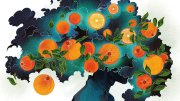Researchers have known for years that eating a Mediterranean diet—which emphasizes vegetables, fruit, and other plant-based foods—reduces depression risk. A recent study by Harvard scientists has now zeroed in on one aspect of the diet, citrus fruit, confirming that eating an orange a day may prevent depression. The project also takes important steps toward understanding how this simple habit might affect mood.
The explanation may lie in the gut microbiome, the teeming ecosystem of microscopic organisms that live in the human digestive tract and interact with human physiology, including the brain and the nervous system. Raaj Mehta, a gastroenterologist at Massachusetts General Hospital and an instructor at Harvard Medical School who has studied the microbiome for nearly a decade, says growing evidence confirms that gut microorganisms influence mood states. When scientists transplanted stool samples from people diagnosed with anxiety into mice, for instance, the rodents began exhibiting anxious behavior. Such findings raise many questions, Mehta says, namely, “How can something in your colon affect something in your brain?”
Growing evidence confirms that gut microorganisms influence mood states.
The citrus project was inspired by Chatpol Samuthpongtorn, a former postdoctoral fellow at Harvard Medical School and current internal medicine resident at Thailand’s Chulalongkorn University, who wanted to explore how intestinal microbes might influence depression. He was intrigued by a small detail in a 2016 paper that suggested a link between regular citrus intake and reduced depression risk. To dig deeper, he and Mehta examined data from the Nurses’ Health Study II, which involved more than 100,000 female registered nurses whom scientists have followed since the 1980s to observe their risk for major diseases. The women regularly complete detailed questionnaires about their health, including how often they eat certain foods.
Mehta and Samuthpongtorn’s analysis confirmed that women who ate citrus fruit did indeed appear to have a lower risk of depression. “We found that eating up to one serving a day can lead to a more than 20 percent reduction in future risk for depression,” Mehta says. This finding was a little surprising, he admits. Plenty of previous research on brain health and nutrition has documented the benefits of foods rich in healthy omega-3 fats, such as salmon and walnuts. “If you had asked us before we started this study, ‘What are the typical brain health foods?’” Mehta notes, “citrus would not have been high on that list.”
The next step was to consider how regular citrus intake might influence intestinal bugs. A group of women involved in the nurses’ health study happened to have also participated in a 2013 sub-study, which collected additional information about their mental health as well as multiple stool samples. This allowed Mehta’s team to investigate how the bacteria in the nurses’ guts reflected their food choices. The scientists identified 15 types of bacteria associated with consuming oranges and grapefruits, and one strain caught their attention: Faecalibacterium prausnitzii, which researchers call F. prau for short.
There are multiple strains of F. prau microbes, which are not yet well understood, Mehta says, but in general, F. prau is associated with better health, including a reduced risk of metabolic disease and inflammatory bowel disease. In this study, Mehta and his colleagues showed that F. prau was abundant in women who were not depressed. And citrus consumption appeared to prompt F. prau to grow. The scientists did not see this growth in people who ate bananas or apples, for example.
This leaves the most complicated question: By what mechanism does F. prau influence depression or anxiety? Mehta and his colleagues have only theories and some preliminary data but are particularly interested in the possibility that F. prau regulates the production of neurotransmitters such as serotonin and dopamine. Mehta hopes other researchers will draw on this work to pursue similar studies exploring the effects of diet on mental health conditions such as depression.
It’s useful to know that a given food is associated with a given health outcome, Mehta says, “but trying to drill down into the details of the how and why is perhaps more important. If we really want to make therapeutic advances, if we really want these types of results to guide how doctors treat patients, we need to show convincingly that this isn’t just chance.”
He’d like to see clinical trials in humans to test if eating a grapefruit or an orange daily can ease depression or prevent it. Mehta is somewhat concerned that this current research might prompt consumers to seek out F. prau supplements. “I don’t want this to be a distraction from the things that are proven to be helpful for depression,” he says, “like behavioral therapy or even medications or seeing a physician.”
Asked if this research has changed the way he eats, Mehta smiles and holds up an orange peel left over from his lunch. “I usually am pretty conservative in interpreting my own data,” he says, “but I do eat more citrus now than I’ve eaten before.”








